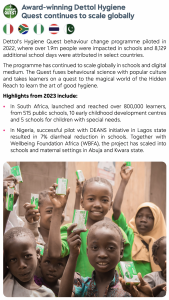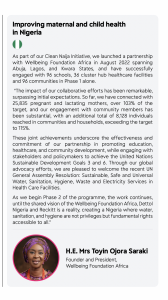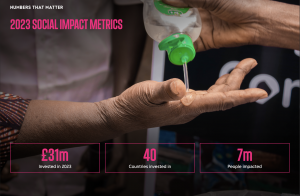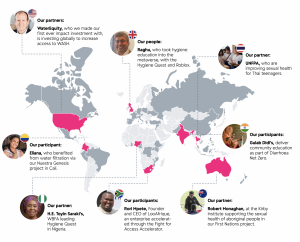Categories
This World Water Day, I am delighted to highlight the progress we have made in activating the Wellbeing Foundation Africa UN Water Conference commitments, actioning the critical importance of safe drinking water, sanitation and hygiene as fundamental human rights for dignity, stability and good health, while advocating for the sustainable management of freshwater resources, to address the global water crisis, in support of the United Nations Sustainable Development Goal 6: Water and Sanitation for All by 2030.
The World Health Organization states that 50% of healthcare facilities worldwide lack basic hygiene, while approximately 32% of healthcare facilities in Africa do not have access to hand hygiene facilities at the points of care. The joint report from UNICEF and WHO reveals that 839 million individuals and 38% of schools continue to lack essential hygiene facilities across the continent. In urban regions, 50% of the population lacks access to these services, compared to 70% in rural areas, highlighting significant disparities. Water scarcity and contamination pose significant challenges to communities around Africa and the globe and repercussions of this crisis are dire, affecting health, education, livelihoods, and overall socio-economic development.
 As featured in The Reckitt Social Impact Investment Report 2023, to address these statistics, and improve outcomes, the Wellbeing Foundation Africa and Dettol Nigeria Hygiene Quest Programme, generously supported by the partnership with the global hygiene brand Reckitt and their commitments to the Clean Naija initiative, provides access to clean water while building long-lasting hygiene habits and community behavioural change. Throughout the next 24 months of Phase 2 programming, WBFA midwives, nurses and healthcare workers will increase the impact and focus on students at schools, mothers and healthcare workers at healthcare facilities, and community members across Lagos, Abuja, and Kwara State.
As featured in The Reckitt Social Impact Investment Report 2023, to address these statistics, and improve outcomes, the Wellbeing Foundation Africa and Dettol Nigeria Hygiene Quest Programme, generously supported by the partnership with the global hygiene brand Reckitt and their commitments to the Clean Naija initiative, provides access to clean water while building long-lasting hygiene habits and community behavioural change. Throughout the next 24 months of Phase 2 programming, WBFA midwives, nurses and healthcare workers will increase the impact and focus on students at schools, mothers and healthcare workers at healthcare facilities, and community members across Lagos, Abuja, and Kwara State.
By recognizing safe drinking water, sanitation, and hygiene as fundamental human rights, we acknowledge the intrinsic value of water in ensuring human dignity and wellbeing. Moreover, we commit to addressing disparities and inequities in access, ensuring that no one is left behind. This inclusivity is not just a moral imperative but also a pragmatic approach towards building resilient and sustainable societies.
Sustainable Development Goal 6 provides a comprehensive framework for action, encompassing targets related to water quality, water use efficiency, water governance, and the protection of ecosystems. Achieving these targets demands innovation, investment, and concerted efforts at all levels. It requires embracing nature-based solutions, investing in infrastructure, promoting water stewardship, and fostering behavioural change.
Beyond meeting basic needs, water plays a pivotal role in driving economic growth and fostering peace and stability. Access to reliable water and sanitation services is essential for industries, agriculture, and energy production, underpinning economic activities and livelihoods. Moreover, water scarcity can exacerbate social tensions and conflict, particularly in regions where resources are scarce.

Conversely, effective water management can be a catalyst for cooperation and peacebuilding. Transboundary water resources often transcend political boundaries, necessitating collaborative approaches for their sustainable management. By fostering dialogue, building trust, and sharing benefits equitably, water can become a source of cooperation rather than conflict.
The 2024 edition of the United Nations World Water Development Report UNWWDR calls attention to the complex and interlinked relationships between water, prosperity and peace, emphasising that only through the power of united partnerships between the private sector, public sector and governments, can we prioritise financial innovation in water infrastructure as per the World Bank Strategic Framework and the policy, research and development needed to lay the principal foundations of a more water resilient and hygiene harmonious future aligned with the Water Action Agenda.
In doing so, we not only pave the way for a more prosperous and equitable future but also contribute to a world where water becomes a symbol of peace, cooperation, and shared prosperity. Together, let us turn the tide on the global water crisis and usher in an era of water security and sustainable development for all.


Categories